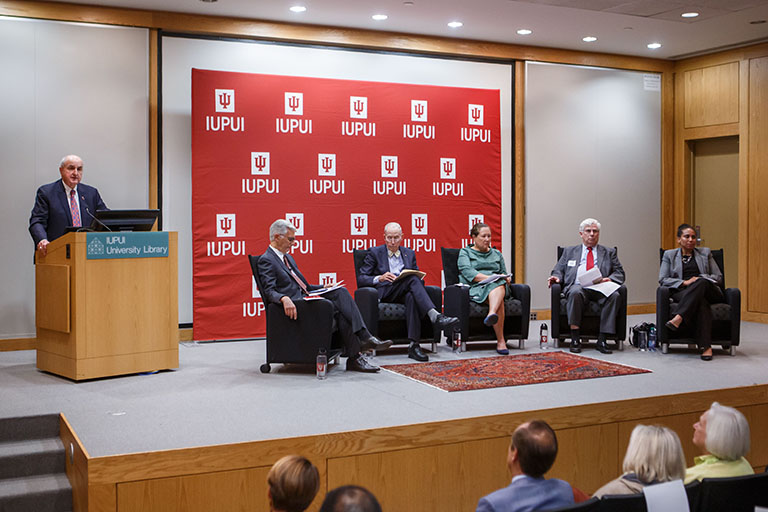Introduction
Thank you very much, Dean (Kristi) Palmer.
I am very pleased to be here today with our distinguished panelists and all of you to help celebrate the establishment of the National Service Archive.
The establishment of this very important archive—and today’s panel discussion on “Indiana University in Service to the Nation”—come at what is an historic time for Indiana University, since for this entire academic year, we are celebrating a truly unique milestones in IU’s history, the 200th anniversary of the university’s founding on January 20, 1820.
Today's panel discussion, in fact, is part of the 200 Festival, a 10-day series of events across the state that officially kick off our yearlong Bicentennial celebration.
During this celebration, of course, we are taking every opportunity to reflect on Indiana University’s rich history and the legacy of its service to the state of Indiana, the nation, and the world.
Indiana University in service to the nation
In its first two centuries, IU's service to the nation has come in many forms.
Among the countless IU alumni who have served the nation at the highest levels are vice presidents Dan Quayle and Mike Pence, former Secretary of Defense Robert Gates, the late Senator Birch Bayh, and Congressman Lee Hamilton, who served as co-chair of the 9-11 Commission.
Another important area in which IU has served the nation was its contributions to the national war efforts during both world wars. During World War I, this came in the form of the establishment of the IU Army ROTC, a program that has achieved great distinction over the years, including being awarded the 2016 General Douglas MacArthur Award as the best ROTC program in the 7th brigade. During World War II, through the Naval Training School, more than 5,000 Navy yeomen and WAVES received training at Indiana University.
IU also offers instruction in around 70 foreign languages each year—more than any other university in the nation—and through this area of strength, IU has contributed heavily over the years to the nation’s service by providing language, regional expertise and culture training for United States Department of Defense personnel. In fact, IU’s Hamilton Lugar School of Global and International Studies recently received a grant to establish a Language Training Center program, which is administered by the Institute of International Education on behalf of the Defense Language and National Security Education Office.
IU has also been ranked for a number of years among the leading universities in the nation in terms of the number of Peace Corps volunteers it produces. More than 1,700 IU alumni have become volunteers since the Peace Corps began in 1961.
And of, course, IU makes important contributions in service to the nation through its many outstanding schools, including the Lilly Family School of Philanthropy here on the Indianapolis campus, the only school of its kind in the United States. I am very pleased to note that the school will be an active partner with the National Service Archive.
Contributions to Americorps and beyond
IU's service to the nation also includes the major contributions it made to the development of AmeriCorps.
In the early 1990s, IU’s 15th president, Tom Ehrlich, who I am greatly honored is with us today as a panelist, along with Les Lenkowsky, IU Professor Emeritus in Public Affairs and Philanthropy—who is also on today’s panel—were both appointed by President George H.W. Bush to serve on the Commission on National and Community Service, which developed AmeriCorps. Both of them also served, during the Clinton administration, as directors of the Corporation for National and Community Service, which administers AmeriCorps. Professor Lenkowsky also served as CEO of the corporation during the first two years of the George W. Bush administration. And former Indianapolis mayor, Steve Goldsmith, who is moderating today’s panel, was appointed chair of the board of directors for the Corporation for National and Community Service in 2001.
Other IU leaders have made important contributions to national service over the years, including Gene Tempel, president emeritus of the IU Foundation and the founding dean of the Lilly Family School of Philanthropy, who served as the first chair of Indiana’s service commission, which oversees national service in the state, and Amy Conrad Warner, Vice Chancellor for the IUPUI Office of Community Engagement, who served as executive director of that commission.
The National Service Archive
And so, give this extensive history—which I have only touched on very briefly—I am delighted that the National Service Archive is being established here on the IUPUI campus. Part of the Philanthropic Studies Archive at the IUPUI Library, it will be the major scholarly resource on national service, holding papers and oral histories from former leaders and those who have served the Corporation for National and Community Service and AmeriCorps. Together with the official documents available in the National Archives, the materials at IU will provide scholars with an unequalled perspective on the evolution of national service.
I think it would be fair to claim that this archive, with which the Corporation for National and Community Service will be cooperating, will make IU the major center for research, teaching, and public programming on national service in the entire country.
I want to thank President Emeritus Tom Ehrlich, Professor Emeritus Les Lenkowsky, Susan Stroud, the former Executive Director of Innovations in Civic Participation, and Shirley Sagawa, the former head of the Youth Service Alliance, for all they have done to bring this important and very valuable archive to Indiana University.
Introducing Chancellor Nasser Paydar
Now, please join me in welcoming to the podium Executive Vice President of Indiana University and the fifth chancellor of the IUPUI campus, Nasser Paydar.


